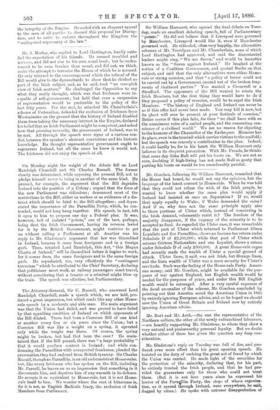Sir William Harcourt, who opened the final debate on Tues-
day, made an excellent debating speech, full of Parliamentary "points." He did not believe that if Liverpool were governed by Manchester, Liverpool would like it, even if Manchester governed well. He ridiculed, often very happily, the alternative schemes of Mr. Trevelyan and Mr. Chamberlain, none of which Lord Hartington had approved, and said the discontented leaders might sing, " We are Seven," and would be hereafter known as the " Seven against Ireland." He laughed at the notion of a Coalition Government, and quoted Burke on that subject, and said that the only alternatives were either Home- rule or strong coercion, and that "a policy of terror could not be carried out by a Government created out of the broken frag- ments of shattered parties." You wanted a Cromwell or a Strafford. The opponents of the Bill wanted to retain the Irish Members, but the first thing they would have to do if they proposed a policy of coercion, would be to expel the Irish Members. "The history of England and Ireland can never be as if this offer had never been made. You may kill it now, but its ghost will ever be present at your festivals of coercion." Better coerce if this plan fails, for then " we shall have with us the unanimous voice of a united people, and the consenting con- science of a civilised world." We see no reason for objecting to the humour of the Chancellor of the Exchequer. Humour has its place, even in the tumbril which carries victims to the scaffold ; but the speech was scarcely a contribution to the plan. Indeed, it could hardly be, for in his heart Sir William Harcourt only believes in its eloquent peroration. With Mr. Fronde, he thinks that some day John Bull will put his boots on. We are not sa sure, doubting if high-living has not made Bull so gouty that putting his boots on would be too unendurably painful.


































 Previous page
Previous page